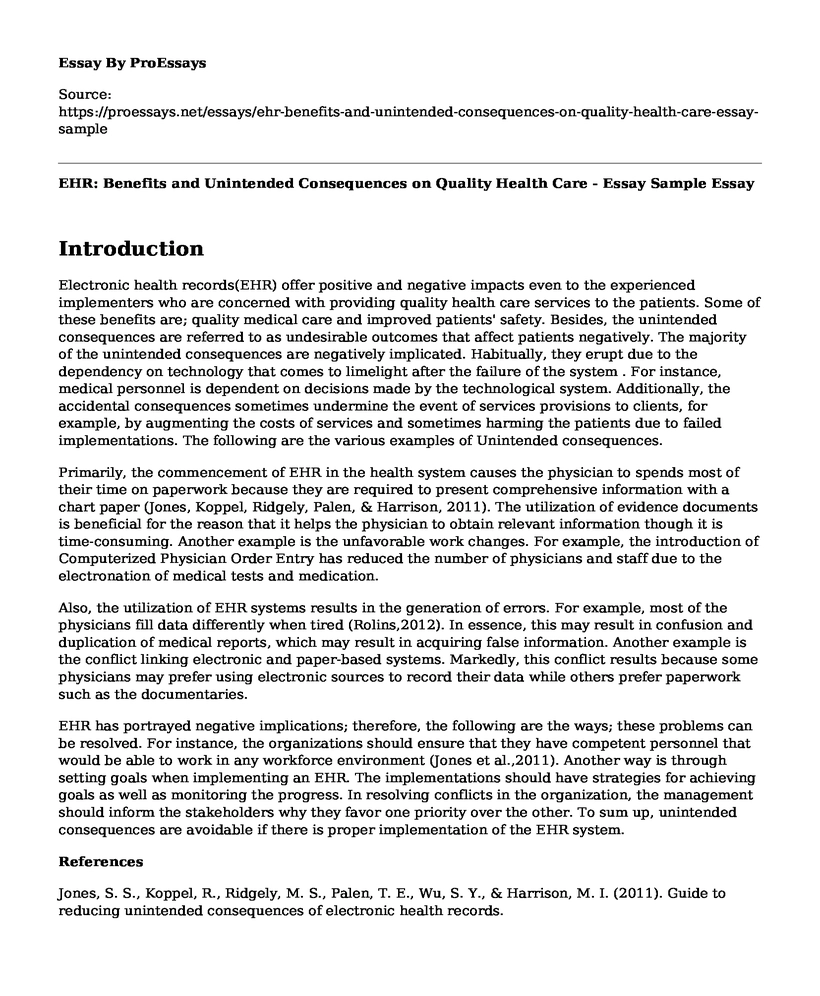Introduction
Electronic health records(EHR) offer positive and negative impacts even to the experienced implementers who are concerned with providing quality health care services to the patients. Some of these benefits are; quality medical care and improved patients' safety. Besides, the unintended consequences are referred to as undesirable outcomes that affect patients negatively. The majority of the unintended consequences are negatively implicated. Habitually, they erupt due to the dependency on technology that comes to limelight after the failure of the system . For instance, medical personnel is dependent on decisions made by the technological system. Additionally, the accidental consequences sometimes undermine the event of services provisions to clients, for example, by augmenting the costs of services and sometimes harming the patients due to failed implementations. The following are the various examples of Unintended consequences.
Primarily, the commencement of EHR in the health system causes the physician to spends most of their time on paperwork because they are required to present comprehensive information with a chart paper (Jones, Koppel, Ridgely, Palen, & Harrison, 2011). The utilization of evidence documents is beneficial for the reason that it helps the physician to obtain relevant information though it is time-consuming. Another example is the unfavorable work changes. For example, the introduction of Computerized Physician Order Entry has reduced the number of physicians and staff due to the electronation of medical tests and medication.
Also, the utilization of EHR systems results in the generation of errors. For example, most of the physicians fill data differently when tired (Rolins,2012). In essence, this may result in confusion and duplication of medical reports, which may result in acquiring false information. Another example is the conflict linking electronic and paper-based systems. Markedly, this conflict results because some physicians may prefer using electronic sources to record their data while others prefer paperwork such as the documentaries.
EHR has portrayed negative implications; therefore, the following are the ways; these problems can be resolved. For instance, the organizations should ensure that they have competent personnel that would be able to work in any workforce environment (Jones et al.,2011). Another way is through setting goals when implementing an EHR. The implementations should have strategies for achieving goals as well as monitoring the progress. In resolving conflicts in the organization, the management should inform the stakeholders why they favor one priority over the other. To sum up, unintended consequences are avoidable if there is proper implementation of the EHR system.
References
Jones, S. S., Koppel, R., Ridgely, M. S., Palen, T. E., Wu, S. Y., & Harrison, M. I. (2011). Guide to reducing unintended consequences of electronic health records.
Rollins, G. (2012). Unintended consequences: identifying and mitigating unanticipated issues in EHR use. Journal of AHIMA, 83(1), 28-32.
Cite this page
EHR: Benefits and Unintended Consequences on Quality Health Care - Essay Sample. (2023, May 10). Retrieved from https://proessays.net/essays/ehr-benefits-and-unintended-consequences-on-quality-health-care-essay-sample
If you are the original author of this essay and no longer wish to have it published on the ProEssays website, please click below to request its removal:
- Hand Hygiene in Nursing - Research Paper
- Paper Example on Chicken Pox Transmission, Control Measures and its Reservoir(s)
- Business Plan for Golden Hearts Senior Care
- Bibi & Jean-Dominique: Accepting Disability & Advocating for Oneself - Case Study
- Nursing Profession-5 Core Values, Responsibilities & Impact - Essay Sample
- Essential Workers: Key Players in Coronavirus Crisis - Essay Sample
- Paper Example on Doctors & Patients: Meeting Challenges in Treatment through Technology







